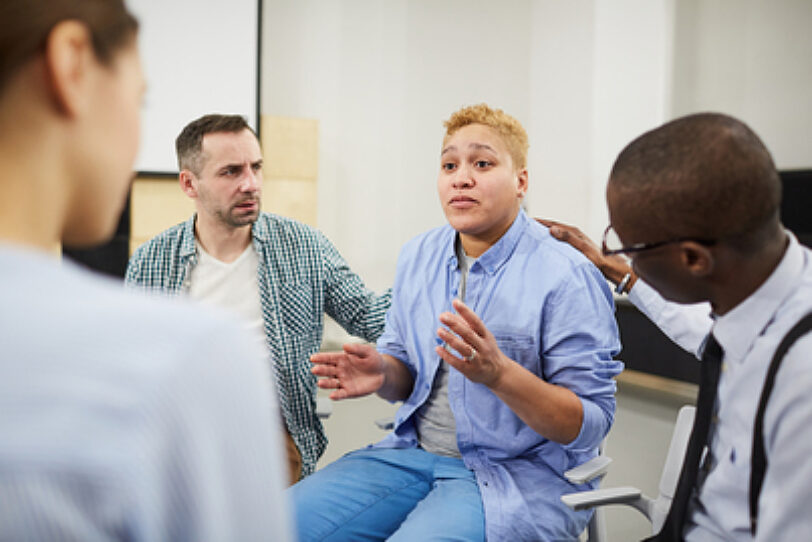
Do social situations fill you with fear and dread? Learn about the causes and symptoms of social anxiety and how therapy can help you overcome it.
Social anxiety is a prevalent emotional disorder that can greatly impact an individual's daily life. It is a persistent fear of social interactions and situations, often accompanied by self-consciousness, embarrassment, and a feeling of being judged.
These feelings can lead to avoidance of social situations, negatively affecting one's personal and professional life. However, with proper understanding and the right tools, overcoming social anxiety and living a fulfilling life is possible.
What is Social Anxiety?
Social anxiety is a feeling of intense nervousness, self-consciousness, and fear in social situations. It is a normal emotion that everyone experiences from time to time. However, for some people, these feelings of anxiety can be so intense and persistent that they interfere with daily life and relationships. This is known as social anxiety disorder (SAD).
People with social anxiety disorder may experience symptoms such as a fear of being judged, evaluated, or rejected in social situations. Additionally, they may fear behaving in a way that might cause embarrassment.
It is also common for people with SAD to experience physical symptoms such as rapid heartbeat, sweating, and an upset stomach when in social situations. Some people may even fear showing physical symptoms of anxiety, such as blushing or shaking, when in front of others. These physical symptoms are also anxiety provoking, as individuals fear others around them will notice.
This can lead to avoiding social situations or enduring them with intense distress, which can greatly limit their life experiences and opportunities.
What Causes Social Anxiety?
While the exact cause of social anxiety is not fully understood, experts believe social anxiety may be influenced by a combination of genetic, environmental, and cognitive factors.
Some research suggests that it may be related to an overactive amygdala, a part of the brain that is responsible for processing emotions. An underactive prefrontal cortex, which plays a role in regulating emotions, may also influence social anxiety.
In addition, people with social anxiety often have negative thought patterns and beliefs about themselves and others. These beliefs can affect the way they approach social situations and exacerbate their symptoms. Trauma and adverse life experiences can also contribute to the development of social anxiety.
Treatment for Social Anxiety
Left untreated, social anxiety and social anxiety disorder can greatly impact an individual's quality of life. While there are several forms of treatment available, psychotherapy and medication are two of the most common and effective treatment options available.
Psychotherapy
Talk therapy, also known as psychotherapy, is a form of treatment that involves talking with a trained therapist or counselor. The therapist will work with the individual to identify and address the underlying causes of their anxiety and help them develop coping strategies to manage their symptoms.
Some of the most commonly used forms of talk therapy for social anxiety include cognitive-behavioral therapy, exposure therapy, and acceptance and commitment therapy.
- Cognitive-behavioral therapy (CBT): CBT focuses on identifying and changing negative thoughts, beliefs, and attitudes that contribute to anxiety. A therapist will work with the individual to identify patterns of negative thinking, such as catastrophizing or self-doubt, and teach them coping strategies to manage their anxiety in social situations.
- Exposure therapy: CBT also includes exposure therapy, which involves gradually exposing the individual to the situations they fear in a controlled and safe environment. As they become more accustomed to these situations, their fear and anxiety will decrease. This can help them to overcome their avoidance behaviors and increase their participation in social activities.
- Acceptance and commitment therapy (ACT): This form of psychotherapy focuses on helping individuals to accept their feelings and thoughts without trying to change them. It also encourages them to engage in activities that align with their values and goals, despite the presence of anxiety.
It's important to note that psychotherapy is a collaborative process between the individual and the therapist. The therapist will work with the individual to create a treatment plan that is tailored to their specific needs and goals.
Medication
Medication is another form of treatment for social anxiety and social anxiety disorder. Several types of medication are used to treat these conditions, including antidepressants and anti-anxiety medications.
Antidepressants, like serotonin-norepinephrine reuptake inhibitors (SNRIs) and selective serotonin reuptake inhibitors (SSRIs), work by increasing levels of norepinephrine and serotonin in the brain. This can ultimately help reduce symptoms of anxiety. Anti-anxiety medications, such as benzodiazepines, work by slowing down the activity of the central nervous system. These and other off-label medications used for anxiety may be prescribed by your doctor to help reduce feelings of anxiety and tension.
Medication typically works best when used in combination with talk therapy. It's important to consult a qualified mental health professional to determine the most appropriate treatment for you.
Ways to Overcome Social Anxiety
While professional help is important and effective, there are also self-help methods that can be implemented to manage and reduce symptoms of social anxiety.
Physical Activity
One of the most effective self-help methods for social anxiety is regular exercise. Exercise has been proven to reduce symptoms of anxiety and depression and improve mood and sleep. Studies have found that even moderate physical activity, such as a 30-minute walk, can have a significant impact on reducing anxiety symptoms. Aim for 20-30 minutes of exercise a few times a week.
Relaxation Techniques
Relaxation techniques, such as deep breathing, progressive muscle relaxation, and yoga, can also be helpful in managing symptoms of social anxiety. These techniques can help to reduce muscle tension, slow down breathing, and calm the mind.
Mindfulness
Mindfulness practices, such as meditation and mindfulness-based stress reduction (MBSR), can also be beneficial in managing symptoms of social anxiety. Mindfulness helps individuals to focus on the present moment and observe thoughts and feelings without judgment. This can help to reduce anxiety and increase acceptance of difficult emotions.
Self-Talk
Another helpful self-help method is self-talk. Self-talk refers to the inner dialogue that we have with ourselves. Negative self-talk can contribute to anxiety symptoms, so it's important to learn how to change it. A person can challenge and change their negative thoughts by asking themselves if the thoughts are realistic and reframing the thought to a more positive one.
Challenge Negative Thoughts
People with social anxiety often have anxious thoughts about themselves and the social situations they find themselves in. Learning to challenge these thoughts by asking yourself if they are based on facts or assumptions and whether there is any evidence to support them can help reduce social anxiety symptoms.
Role-Play
Role-play can be a helpful tool in overcoming social anxiety, as it allows individuals to practice and become more comfortable with social interactions in a controlled and safe environment.
Role-playing different social scenarios can help individuals with social anxiety to develop and practice new social skills, learn how to respond to and handle challenging social situations, build self-confidence, and learn how to manage anxiety symptoms. This can include practicing starting conversations, making phone calls, or rehearsing social situations that make you nervous.
Establish a Support Network
Creating a support network can be extremely beneficial for individuals with social anxiety. A support network can provide a sense of belonging, understanding, and validation.
Talking to others who have faced similar challenges can help you learn new coping strategies and gain a different perspective on your own experiences. Additionally, supportive friends and family members can provide encouragement and motivation to try new things and step out of your comfort zone.
Go Easy on Yourself
It is important to go easy on yourself when working to overcome social anxiety. Making progress can be difficult, and setbacks can happen. Being too hard on yourself can lead to feelings of discouragement and frustration, making it more difficult to overcome your social anxiety.
Being gentle with yourself can help you to be more compassionate and understanding towards yourself, which can make it easier to identify and address the underlying causes of your social anxiety.
Get Professional Help
If self-help methods are not enough, consider seeking professional help from a therapist or counselor who can help you understand and manage your social anxiety. In many cases, self-help methods often work well in conjunction with professional help. A therapist can work with the individual to create a treatment plan that includes self-help methods and other interventions to manage their social anxiety.
When to Seek Help
Common signs that someone may benefit from seeking help for social anxiety include:
- Feeling excessively self-conscious or nervous in social situations
- Avoiding social interactions or events
- Experiencing intense anxiety or fear in social situations
- Difficulty making and maintaining friendships
- Physical symptoms such as shaking, sweating, or blushing in social situations
- Negative impact on daily life activities, work, or studies.
If these symptoms are impacting a person's ability to function in their daily life, it may be beneficial for them to seek help such as therapy or counseling. Medications may also be helpful in some cases. It is important to consult a qualified mental health professional for an assessment and treatment recommendations.
Talk Therapy with CHE
Social anxiety is a common condition that can greatly impact a person's daily life. However, treating and managing this condition is possible. Understanding the symptoms and causes of social anxiety can often be the first step in overcoming it.
CHE Behavioral Health Services offers a range of therapeutic approaches for individuals struggling with social anxiety. Our experienced team of mental health professionals provide compassionate care to help you change negative thoughts and behaviors that contribute to social anxiety. Don't let social anxiety control your life. Let our team of experts help you overcome it.
For more information about social anxiety and treatment options offered by CHE, please call 888-515-3834. We are ready to talk and ready to listen.



